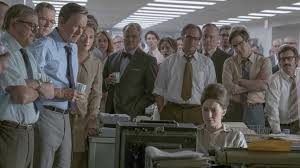‘The Post’ Review: Tom Hanks’ Newspaper Thriller Can’t Write the Wrongs

Two elite newspapers competing to publish a politically charged expose. A vindictive and shadowy president. A drag-out fight over the power of the First Amendment. Sound familiar? Director Steven Spielberg’s 1971-set newspaper thriller, The Post, has been drawing big headlines because it happens to be remarkably topical to our current climate. Does the relevancy guarantee greatness? Of course not. Nobody gets excited to plunk down money at a theater because of a period movie’s parallels to modern times. There must be more. There is . . . just barely.

The Washington Post team watch the drama unfold on TV (Fox)
Indeed, The Post would be a thought-provoking newspaper thriller during any administration. (Fun fact: Screenwriters Liz Hannah and Josh Singer wrote the movie when Barack Obama was still in office. Spielberg shot it over the summer.) It’s a high-quality, all-star production that boasts a stacked cast and a musical score from the legendary John Williams. Every character on screen — even the lowly intern — is more intelligent than you, and Spielberg prides himself on it. The roll-up-the-sleeves-and-dig-in attitude is a joy to watch; the multitude of self-righteous monologues are anything but.
The Post is a back-door prequel to the 1976 classic All the President’s Men, which depicted how the Washington Post broke the Watergate scandal and brought down a presidency. Here, the journalists who dug deep to track down the Big Story is a sidebar. The focus is instead planted on the top brass that cut through the red tape to make it happen. Sidebar to the sidebar: Watch All the President’s Men.
Venerable Washington Post top editor Ben Bradlee (Tom Hanks) keeps one eye on his reporters and the other on what’s going on at the paper’s national rival, The New York Times. At first, his most pressing matter is why his paper is banned from covering the 1971 nuptials of President Richard Nixon’s daughter, Tricia. Then he learns that the Times has seen it fit to print a section of the damning Pentagon Papers — stolen, secret official documents proving that the U.S. government has misled the public of the country’s involvement in the Vietnam War for well more than two decades.
An exasperated government official named Daniel Ellsberg (Matthew Rhys) is the one who steals the report and leaks it to the Times. He soon gives the reams of documents to a Washington Post reporter (Bob Odenkirk) as well. Bradlee can taste the bombshell front-page expose. But before he starts the presses, he must first get the go-ahead from the Post’s newly installed publisher, Katherine Graham (Meryl Streep). She’s the purported bad cop, the one mindful of the financial and legal consequences to shining a harsh light on the presidency. Her paper just went public. A society queen, she’s also friends with the Secretary of Defense (Bruce Greenwood), who’s responsible for promoting some of the lies.
Spielberg tries valiantly to squeeze urgency out the will-they-or-won’t-they publish drama. It doesn’t quite happen. From a logical (and admittedly cynical) perspective, he wouldn’t take the time to helm the movie and rush it out for Oscar season if this ended with money concerns prevailing over journalistic integrity.
Also, a simple request for a moratorium on movies in which dogged reporters and editors — here, played by the likes of Odenkirk, his Mr. Show partner David Cross, and Carrie Coon — type away at all hours to push the story across the finish line on a tight deadline. It’s a perfunctory narrative device seen in every similarly themed movie from All the President’s Men to Spotlight. It only fascinates here because we get to marvel at how 70s-era journalists functioned without a laptop and a charger. Yet, rather frustratingly, Spielberg back-burners these newsroom sights and sounds for long-winded speeches about bravery. We’re well-aware that the story is important, the First Amendment is vital and the public has a right to know. Having all the VIPs in the room continually underline this point adds a sanctimonious bent to the proceedings.

Hanks is a regular visitor inside Streep’s townhouse. (Fox)
The difference-maker is Streep’s fascinating, Golden Globe-nominated portrayal of a middle-aged businesswoman thrown into a pressure-cooker of a job by way of her now-deceased husband. As she reminds her daughter (Alison Brie), this is her first paid job. The well-mannered Graham is strong and capable — and she’s plagued with self-doubt about these very characteristics. She’s in charge, yet the males around her constantly scrutinize her every move. She and Hanks’ Bradlee have a cordial and respectful dynamic, yet it’s hard not to cringe when he tells her early on to stop poking him in the eye with her opinions. (When she finally uses her gut and makes the hard decision, the audience in my screening room burst into applause.) Her leadership is timeless in any era.
The Post opens in theaters everywhere on Friday, January 12
Also published on Medium.






